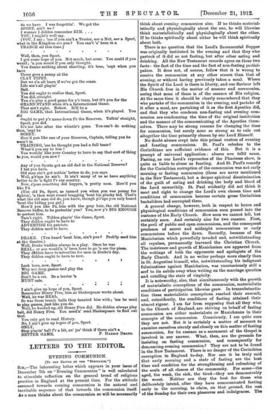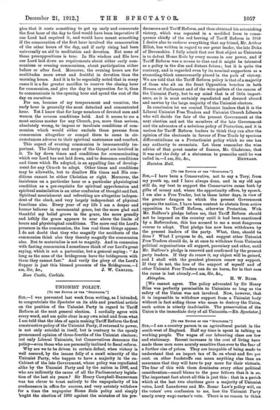LETTERS TO THE EDITOR.
EVENING COMMUNION.
[To THE EDITOR OP TEE "SPECTATOR."] SIR,—The interesting letter which appears in your issue of December 7th on " Evening Communion " is well calculated to stimulate reflection on the general trend of religious practice in England gtt the present time. For the attitude assumed towards evening communion is the natural and inevitable sequence of that towards the communion itself. As a man thinks about the communion so will he necessarily
think about evening communion also. If he thinks material- istically and physiologically about the one, he will likewise
think materialistically and physiologically about the other. If he thinks spiritually about either he will think spiritually about both.
There is no question that the Lord's Sacramental Supper was originally instituted in the evening and that they who partook of it did so not fasting, but after other eating and drinking. All the New Testament records agree on these two facts : the fact of the time and the fact of non-fasting partici- pation. It does not, of course, follow that it is wrong to receive the communion at any other season than that of evening, or without having previously taken a meal. Where the Spirit of the Lord is there is liberty, and out• Saviour left His Church free in the matter of seasons and ceremonies, seeing that none of these is of the essence of His religion.
At the same time it should be clearly remembered that they who partake of the communion in the evening, and partake of it after a meal, are partaking of it as the first Apostles did, and that they who condemn non-fasting and evening com- munion are condemning the time of the original institution and the manner of the communicating of the Apostles them- selves. There may be strong reasons for changing the time for communion, but surely none so strong as to rule out altogether the time primarily chosen by our Lord Himself.
No doubt abuses crept into this primal custom of evening and feasting communions. St. Paul's rebukes to the Corinthians are sufficient evidence of this. But it is a precept of universal application : abusus non tollit usurp. Fasting, as our Lord's reproaches of the Pharisees show, is quite as liable to abuse as feasting. And St. Paurs remedy for the Corinthian corruption of the communion was not early morning or fasting communion (these are never mentioned in the New Testament), but a deeper spiritual discrimination of the guilt of eating and drinking the body and blood of the Lord unworthily. St. Paul evidently did not think it meet and right to change the Lord's own chosen time and conditions of communion because certain gross Corinthian backsliders had corrupted them.
A general change, however, both in respect to hours and physiological conditions of communion soon passed into the customs of the Early Church. How soon we cannot tell, but certainly soon. And certainly also for two reasons. First, the peril of public and open communions, and the consequent prudence of secret and midnight communions or early communions before the dawn. Secondly, because of the Manichaeism which powerfully invaded and, notwithstanding all repulses, permanently leavened the Christian Church. The insistence and growth of Manichwism are apparent from the writings of both the opponents and apologists of the Early Church. And in no writer perhaps more clearly than in St. Augustine himself, who, notwithstanding his indignant fulminations against Manichmism, was unconsciously still a serf to its subtle sway when writing on the marriage question and extolling the state of virginity.
It is noteworthy, also, that simultaneously with the growth of materialistic conceptions of the communion, materialistic conditions of participation likewise grew. In transubstantia- tion these materialistic conceptions reached their summit, and, coincidently, the conditions of fasting attained their utmost rigour. I am far from supposing that all they who, in the Church of England, are striving on behalf of fasting communion are either materialists or Manichwans in their concepts of the communion. Consciously, I am quite sure they are not. But it is certainly a matter of moment to examine ourselves sternly and closely on this matter of fasting communion, for its essence as a sacrament of the Gospel is involved in our answer. What, then, are the grounds for insisting on fasting communion, and consequently for denouncing evening communion? They are not to be found in the New Testament. There is no danger of the Corinthian corruption in England to-day. Nor can it be truly said that early morning and a state of fasting are the best time and condition for the strengthening and refreshing of the souls of all classes of the community. For some—the aged, the weak, the sick, the tired—they are demonstrably the worst. Neither are they the best for those who deliberately intend, after they have communicated fasting early in the morning, to claim, on that ground, the rest of the Sunday for their own pleasures and indulgences. The
plea that it costs something to get up early and consecrate the first hour of the day to God would have been imperative if our Lord had required it, and would have meant something if the consecration of the first hour involved the consecration of the other hours of the day, and if early rising had been universally an aid to meditation and devotion. But none of these presuppositions is true. In His wisdom and His love our Lord laid down no requirements about either early com- munions or evening communions, about participation either before or after food. Moreover, the evening hours are for multitudes more sweet and fruitful in devotion than the morning hours. And it is to be especially noted that in many cases it is a far greater sacrifice to reserve the closing hour for communion, and give the day in preparation for it, than to communicate in the opening hour and spend the rest of the day on ourselves.
For me, because of my temperament and vocation, the early hour is generally the most detached and concentrated hour. Yet I know that for large numbers of devoted men and women the reverse conditions hold. And it seems to me a most serious matter for any Church, yea, more than serious, absolutely wrong, to impose or inculcate conditions of com- munion which would either exclude these persons from communion altogether or compel them to come in cir- cumstances adverse to their spiritual sustenance and comfort.
This aspect of evening communion is immeasurably im- portant. The liberty and scope of the Gospel are involved in it. To lay down times and conditions for communicating which our Lord has not laid down, and to denounce conditions and times which He adopted, is an appalling line of develop- ment for any Church to adopt. Other times and conditions may be allowable, but to disallow His times and His con- ditions cannot be either Christian or right. Moreover, the insistence on a particular hour or a particular physiological condition as a pre-requisite for spiritual apprehension and spiritual assimilation is an utter confusion of thought and fact. Spiritual nourishment and refreshing are altogether indepen- dent of the clock, and very largely independent of physical functions also. Every year of my life I am a deeper and keener believer in sacramental grace, but the more glad and thankful my belief grows in the grace, the more grandly and loftily the grace appears to soar above the limits of hours and physiological conditions. The more real the Lord's presence in the communion, the less real these things appear. I do not doubt that they who magnify the accidents of the communion think also they thereby magnify the communion also. But to materialize is not to magnify. And in connexion with fasting communion I sometimes think of our Lord's great saying, which is not a particular, but a general saying : " Aa long as the sons of the bridegroom have the bridegroom with them they cannot fast." And verily the glory of the Lord's Supper is just this blessed presence of the Bridegroom.—I











































 Previous page
Previous page